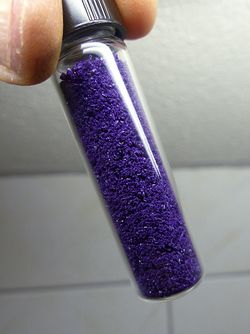Difference between revisions of "Bis(ethylenediamine)copper(II) perchlorate"
| (2 intermediate revisions by the same user not shown) | |||
| Line 52: | Line 52: | ||
| BoilingPtC = | | BoilingPtC = | ||
| BoilingPt_ref = | | BoilingPt_ref = | ||
| − | | BoilingPt_notes = | + | | BoilingPt_notes = Detonates |
| Density = | | Density = | ||
| Formula = C<sub>2</sub>H<sub>4</sub>O<sub>8</sub>N<sub>2</sub>Cl<sub>2</sub>Cu<br>[Cu(en)<sub>2</sub>](ClO<sub>4</sub>)<sub>2</sub> | | Formula = C<sub>2</sub>H<sub>4</sub>O<sub>8</sub>N<sub>2</sub>Cl<sub>2</sub>Cu<br>[Cu(en)<sub>2</sub>](ClO<sub>4</sub>)<sub>2</sub> | ||
| HenryConstant = | | HenryConstant = | ||
| LogP = | | LogP = | ||
| − | | MolarMass = | + | | MolarMass = 318.51 g/mol |
| MeltingPt = | | MeltingPt = | ||
| MeltingPtC = | | MeltingPtC = | ||
| MeltingPt_ref = | | MeltingPt_ref = | ||
| − | | MeltingPt_notes = | + | | MeltingPt_notes = Decomposes |
| pKa = | | pKa = | ||
| pKb = | | pKb = | ||
| Line 105: | Line 105: | ||
| OtherFunction = | | OtherFunction = | ||
| OtherFunction_label = | | OtherFunction_label = | ||
| − | | OtherCompounds = | + | | OtherCompounds = [[Tris(ethylenediamine)nickel perchlorate]] |
}} | }} | ||
}} | }} | ||
| Line 118: | Line 118: | ||
===Physical=== | ===Physical=== | ||
Crystals of bis(ethylenediamine) copper(II) perchlorate are far from dense - there is a nearly tenfold increase in volume from the starting material, [[copper(II) oxide]]. It is quite soluble in water. | Crystals of bis(ethylenediamine) copper(II) perchlorate are far from dense - there is a nearly tenfold increase in volume from the starting material, [[copper(II) oxide]]. It is quite soluble in water. | ||
| + | |||
| + | ===Explosive=== | ||
| + | It explodes when exposed to an open flame. | ||
==Availability== | ==Availability== | ||
| Line 149: | Line 152: | ||
[[Category:Energetic materials]] | [[Category:Energetic materials]] | ||
[[Category:Energetic copper compounds]] | [[Category:Energetic copper compounds]] | ||
| − | [[Category:Primary | + | [[Category:Primary explosives]] |
Latest revision as of 10:01, 19 November 2017
 The copper complex in solid form.
| |
| Properties | |
|---|---|
| C2H4O8N2Cl2Cu [Cu(en)2](ClO4)2 | |
| Molar mass | 318.51 g/mol |
| Appearance | Dark purple |
| Melting point | Decomposes |
| Boiling point | Detonates |
| Soluble | |
| Solubility | Reacts with acids |
| Hazards | |
| Safety data sheet | None |
| Related compounds | |
| Related compounds
|
Tris(ethylenediamine)nickel perchlorate |
| Except where otherwise noted, data are given for materials in their standard state (at 25 °C [77 °F], 100 kPa). | |
| Infobox references | |
Bis(ethylenediamine)copper(II) perchlorate is an energetic coordination complex of copper(II) made from perchloric acid and ethylenediamine. It is a fluffy purple solid which is nearly black in a concentrated solution. It appears to be indefinitely storable.
A general formula for the compound is [Cu(en)2](ClO4)2, where en is ethylenediamine.
Contents
Properties
Chemical
Bis(ethylenediamine)copper(II) perchlorate is prone to detonation on light heating.
Physical
Crystals of bis(ethylenediamine) copper(II) perchlorate are far from dense - there is a nearly tenfold increase in volume from the starting material, copper(II) oxide. It is quite soluble in water.
Explosive
It explodes when exposed to an open flame.
Availability
Bis(ethylenediamine)copper(II) perchlorate is not commerically available but is easy to prepare.
Preparation
Bis(ethylenediamine)copper(II) perchlorate is prepared through the complexation of a solution of copper(II) perchlorate with ethylenediamine. Since copper(II) perchlorate is not a very commonly encountered chemical, it is often prepared in solution during this synthesis by the addition of an excess of copper(II) oxide to dilute perchloric acid. A detailed preparation can be found here.
Projects
- Flash powder
Handling
Safety
Keep away from open flames, as the compound will detonate.
Storage
Best to use it shortly after synthesis.
Disposal
The compound should be detonated in a safe place. It can also be neutralized by reducing it with metallic iron under UV light, in anaerobic conditions.